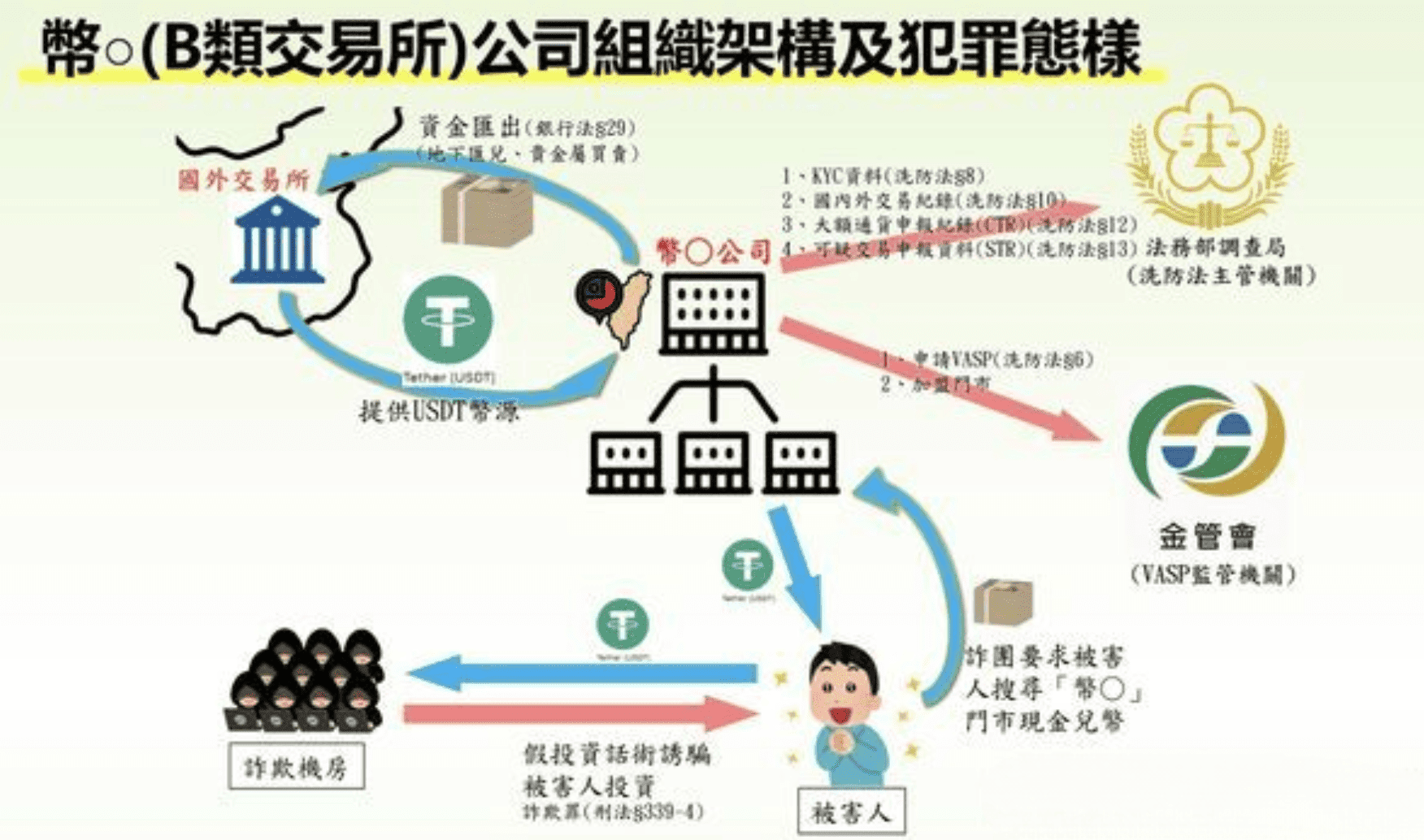The company 'CoinW Technology Bitshine,' which has 45 stores across Taiwan, was discovered by prosecutors and police to have consistently served as a money laundering tool for the fraud group, leading to thousands of victims losing all their investments within a year, with the fraud amount reaching NT$1.2 billion. The main suspect Shi Qiren and 14 others are now indicted by prosecutors, marking one of the largest virtual currency fraud cases in Taiwan's history.
Fake legal packaging makes CoinW a hotbed for money laundering.
According to ETtoday reports, prosecutors and police indicated that the main suspect Shi Qiren hails from the criminal organization Tiandao Alliance. He first used funds from another exchange CoinW to acquire 'CoinW Company' with NT$19.2 million worth of $USDT, thereby obtaining the shell of an anti-money laundering declaration from the Financial Supervisory Commission, claiming to be 'the only authorized entity by the Financial Supervisory Commission.'
Subsequently, he and his accomplices set up over 40 franchise stores across Taiwan to sell $USDT, with franchisees required to pay high royalties and deposits, while store employees were responsible for receiving and transferring cash. On the surface, it appeared to be compliant trading, but the cash flow was entirely controlled by the fraud group.
It is reported that the fraud group used Facebook and dating platforms to post 'fake investment' advertisements, luring victims to bring cash to stores to buy currency, with employees guiding victims through identity verification (KYC) and then collecting cash to exchange for $USDT.
Complex cash flow operations created a break in the flow of currency.
Investigations revealed a meticulously designed money laundering mechanism: after cash deposits, the funds were first transferred by a security company to an account controlled by a man named Wang, then converted to USD to purchase $USDT, and finally flowed into CoinW's wallet before being transferred to an anonymous wallet, creating a break in the flow of funds that made it difficult for the police to trace.

In just over a year, 1,539 victims have been reported across Taiwan, with fraud amounts reaching NT$1.27 billion, and money laundering flow exceeding NT$2.3 billion.
Prosecutors and police searched 48 locations across Taiwan, seizing virtual currencies worth approximately NT$20 million, including $BTC, $USDT, and $TRX, over NT$60 million in cash, NT$12.4 million in company account deposits, one Ferrari Roma and one Maserati, totaling approximately NT$113 million in assets.
Meticulously divided roles: High-level personnel of CoinW are involved.
The prosecution traced the roles of the 14 defendants, covering almost every aspect of the company:
Shi Qiren: Core main suspect, leading the acquisition of CoinW, recruitment, and market operations.
Yang: CoinW's business director for the Asia-Pacific region, coordinating the fraud group and market operations.
Wang: Head of the company in charge of managing cash flow.
Lin (Shi Qiren's wife): CoinW's marketing director for the Asia-Pacific region, promoting brand awareness.
Huang, Xu, and Li: CoinW business development team, recruiting KOLs and agents, earning commissions based on trading volume.
Two men surnamed Chen: respectively responsible for product management and community editing, maintaining the website and promoting community engagement.
Luo and Su: Store managers at the Keelung and Xinyi locations, responsible for handling cash and currency exchange.
Ye: Compliance officer, designing formal KYC systems.
Cai: Risk control supervisor, responsible for nominal withdrawal audits, which were actually bypassed by the fraud group.
Gu: Also involved in fraud, falsely claiming to assist with anti-money laundering registration, defrauding NT$3 million.
Such an organizational structure shows the deep overlap between CoinW and CoinW in business.
Legal defense: The main suspect denies the charges, and the prosecution seeks heavy sentences.
In response to the prosecution's accusations, Shi Qiren completely denied the charges, claiming he was only acquiring the company to operate franchises, with the source of funds being loans. Yang and Wang admitted that the business overlap with CoinW was significant but claimed it was merely a business and cash flow collaboration. Most other defendants emphasized they were just employees and were unaware of the fraud and money laundering.
The prosecution ultimately indicted 14 people for aggravated fraud, violation of anti-money laundering laws, organized crime prevention regulations, and unregistered provision of virtual asset services. They sought a 25-year prison sentence for the main suspect, Shi Qiren.
If Yang and Wang cooperate with confessions and return the proceeds of their crimes, they may receive reduced sentences; the other involved personnel are suggested to receive lighter sentences, with some potentially eligible for probation; Gu is separately recommended to receive a 5-month sentence.
Virtual currency fraud is rampant, and the prosecution warns that severe punishment is necessary.
The prosecution criticized that this case highlights regulatory loopholes in the virtual currency market. Shi Qiren and others pretended to act under a legal guise while colluding with the fraud group, resulting in thousands of victims suffering severe property losses and further eroding social trust. Especially since the main suspect later did not plead guilty and had a bad attitude, strict punishment is necessary to effectively curb the increasingly rampant virtual currency fraud.
This article is reprinted with permission from: (Chain News)
Original title: (CoinW Becomes the Largest Black Money Factory in History: Fraud Group's NT$2.3 Billion Money Laundering Flow Cannot Be Hidden, 14 Suspects Indicted)
Original author: Crumax
'The CoinW Money Laundering Case' reveals high-level involvement from CoinW: The gang only spent nearly NT$20 million to acquire the original CoinW.' This article was first published in 'Crypto City.'


